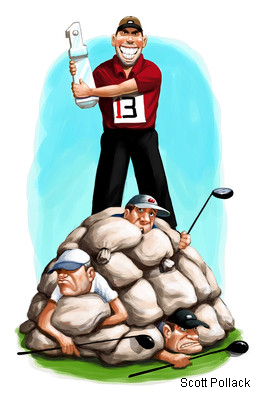Fighting Back Against Sandbaggers
The Game's Greatest Criminal Offense Isn't Going Away, But Some Rules Mavens Are Working On It

· GOLF JOURNAL
· JULY 2, 2011 Wall Street Journal
· By JOHN PAUL NEWPORT
Last month, a friend of mine returned from a member-guest tournament complaining about the blatant sandbagger whose two-man team won the overall event, a big trophy and several hundred dollars in pro-shop credit. The guy, a member of the host club, claimed a midteens handicap, but in his practice round shot a couple of strokes over par. The odds against a true midteens handicapper shooting such a score are greater than 37,000 to 1 (more on those odds later).
 Using an inflated handicap to unfairly gain strokes in competition is nothing new for golf. Part of the fun of the earliest club competitions back in Britain was the pretournament dinner, at which the official "assigner of the odds" often opened the floor to debate about his judgments. Colorful bickering, cajoling and outright groveling ensued. Using an inflated handicap to unfairly gain strokes in competition is nothing new for golf. Part of the fun of the earliest club competitions back in Britain was the pretournament dinner, at which the official "assigner of the odds" often opened the floor to debate about his judgments. Colorful bickering, cajoling and outright groveling ensued.
These days, alas, sandbagging is more surreptitious. All the practitioner needs to do is avoid entering a few low scores into the computer, or subtly manipulate the scores he or she does post, such as by deliberately missing short putts that don't factor into winning a hole. In the absence of sufficient peer pressure and a diligent pro-shop staff or handicap committee, that handicap becomes official.
Although "sandbagging" can be interpreted wherever the imagination wants to take you (see the accompanying illustration), the term is generally thought to derive from old English gangs, who used rolled-up bags of sand to physically knock out rivals. Poker used the expression before golf, to describe a betting strategy in which a player with a strong hand lures opponents into wagering ever-bigger sums by acting as if he has nothing to work with. Then he knocks them out. In poker, however, ploys like that are the essence of the game. In golf, they're cheating.
Luckily, a few modern tools have come along that can help suss out sandbaggers and allow tournament directors to deal with them in an objective manner. They are based primarily on the work of Dean Knuth. These days he designs intelligence systems for the military, the CIA and Homeland Security, but for 16 years ending in 1997 Knuth was director of handicapping for the U.S. Golf Association. There he refined and improved the USGA's handicapping system. He also invented the Slope system for rating courses, which is now used around the world.
Among the most fascinating pages on Knuth's website, popeofslope.com, is one titled "Odds of Shooting an Exceptional Tournament Score." A player in the 13-to-21 handicap range, for example, will shoot better than his course handicap only one round in every six. (The course handicap is derived from a player's handicap index, based on the difficulty of the course being played.) Three strokes better: one round in 43. Six strokes better: one round in 323. (Remember, handicaps are based on the 10 best of one's 20 most recent rounds, and thus are a measure of potential, not of average performance. The average score for players with handicaps equates to three strokes over their course handicap.)
Handicaps are amazingly predictive when they are real—that is, when every score is accurately posted. For players working to improve, this can be frustrating. "We've found that 72% of all golfers end the year within two strokes, plus or minus, of where they started the year," Knuth told me. The upside of this durability, however, is that sandbaggers who post wildly better tournament scores stand out. The odds of a midrange player shooting eight strokes better than his course handicap are 1 in 1,138. The odds of him doing that twice in 20 rounds (much less in a two- or four-round tournament) are 1 in 14,912.
"Statistically speaking, it's impossible," Knuth said.
As a first line of defense against sandbagging, the USGA system will automatically reduce a player's handicap when he or she posts two designated tournament rounds in a 12-month period that are three strokes or more better than their handicap. An "R" for reduced appears beside his or her index number in the handicap listing.
But clubs or associations that run numerous handicapped, or net, tournaments are using another, more effective Knuth invention called the Tournament Points System. It keeps track only of how golfers place in net events, regardless of what they score. The winner receives five Knuth points, second place gets four points, and so forth. When any player earns seven or more points in a rolling two-year period, his handicap for the next event is automatically shaved according to a formula. The reduction has no effect on the golfer's official USGA handicap, only on the handicap used in that club's tournaments.
Two of the clubs I talked to that have recently implemented the system—one in California, the other in Texas—quickly uncovered sandbaggers who needed to have six strokes deducted from their tournament handicaps. "The perception that everything is fair is a big advantage," said Chip Evans of Lost Creek Country Club in Austin, Texas. In many cases, Knuth said, clubs are reluctant to confront members playing with unjustified handicaps. "It can be very uncomfortable. The system gives them something formal to justify their actions," he said.
None of this helps prevent an unwise wager outside a tournament context, based on the self-reported handicap of a friendly, inept-seeming player who maybe wants to play for a little something at the local muni. Sam Snead had some sound advice for that circumstance: "You should never gamble with a stranger, and consider everyone a stranger until you've played with him at least a dozen times."
|




